Does your child groan at the mention of math homework? Or do you find it hard to keep your students engaged with traditional teaching methods? These challenges are common, but the right tools can make all the difference. In this blog, we’ll explore math websites for kids that are designed to turn frustration into fun, helping children actually look forward to learning math.
Math & ELA | PreK To Grade 5
Kids see fun.
You see real learning outcomes.
Watch your kids fall in love with math & reading through our scientifically designed curriculum.
Parents, try for free Teachers, use for free
Whether you’re at home or in the classroom, here are some of the best math websites for kids that offer strategies that truly engage kids and make math something they enjoy.
1. SplashLearn
Who is it for: Prek to 5th Grade
SplashLearn is a comprehensive, curriculum-aligned math platform designed to make math learning fun and effective for kids. With over 8,000 interactive math resources, it covers essential math topics such as addition, subtraction, multiplication, division, fractions, geometry, and more. The platform turns math into a game-like experience, helping children build confidence and mastery through engaging content.
How SplashLearn Teaches Math?
- Interactive Games: Math concepts are reinforced through fun, interactive games that keep kids engaged.
Begin here
- Printable Worksheets: If you are looking for math practice websites, SplashLearn offers a wide array of worksheets for additional practice, ideal for reinforcing classroom learning.
Begin here
- Live Classes: Expert-led sessions provide deeper understanding and allow kids to interact and learn in real-time. Read more about it here.
What are the key features of SplashLearn?
- Personalized Learning Paths: Adapts to each child’s learning pace, ensuring that they progress with confidence.
- Progress Tracking: Detailed reports for parents and teachers to monitor student growth and identify areas for improvement.
- Motivational Rewards: Kids earn coins, rewards, and certificates, turning learning into a rewarding experience.
Why Choose SplashLearn?
For Parents
- Customizable daily learning paths
- Curriculum-aligned content
- Engaging rewards
- Critical thinking games
For Teachers
- Compatible with Google Classroom and Clever
- Access to over 11,000 free worksheets
- Free assignment access for home use
- Free ready-to-use lesson plans and teaching tools
2. Funbrain
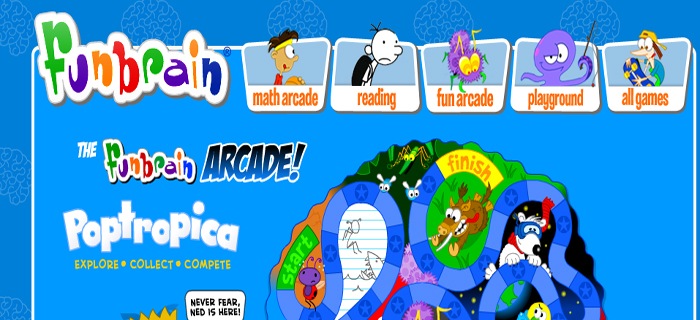
Who is it for: Pre-K to 8th Grade
Funbrain offers a variety of math-focused games designed to reinforce key concepts such as basic arithmetic (addition, subtraction, multiplication, division), fractions, and problem-solving skills. The math games are organized by grade level, allowing children to practice skills that align with their current curriculum.
The platform uses interactive activities like “Math Baseball” and “Tic Tac Toe Squares” to make math practice more engaging. While primarily game-based, Funbrain also provides math-related puzzles and challenges that encourage logical thinking.
Related Reading: Best Game-Based Learning Platforms for Kids
3. Prodigy
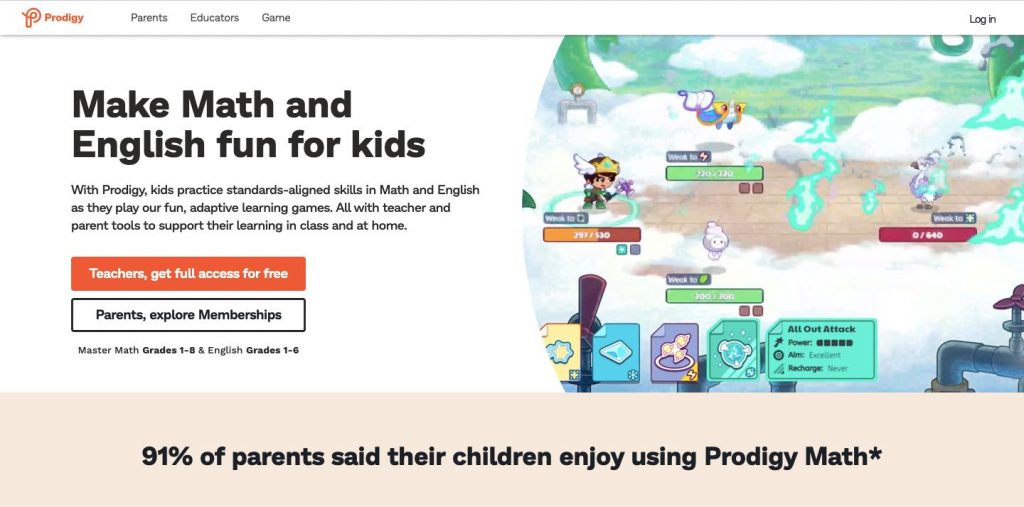
Who is it for: 1st to 8th Grade
Prodigy is an adaptive math platform that turns learning into a role-playing game where students solve math problems to progress through various challenges and levels. It covers a wide range of math topics, from basic arithmetic to more complex concepts like geometry and fractions, aligning with common core standards.
The game adjusts its difficulty based on the student’s performance, ensuring personalized learning. Prodigy also offers robust tools for teachers and parents, including progress reports and the ability to assign specific skills for practice, making it a powerful tool for both classroom and home use.
4. PBS
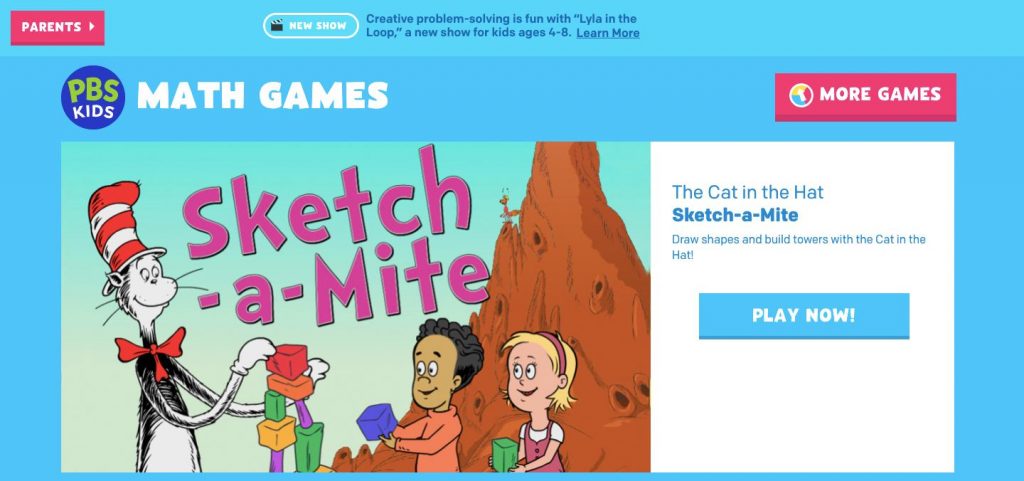
Who is it for: Pre-K to 3rd Grade
PBS is one of the best educational math websites that offers a collection of math games and activities that are designed to help younger students grasp foundational math concepts. The website features interactive games that teach counting, basic arithmetic, shapes, and measurement through engaging characters and stories familiar from PBS shows like “Peg + Cat” and “Odd Squad.”
The activities are designed to reinforce classroom learning and are particularly useful for visual and auditory learners. Teachers and parents can use PBS Math as a supplemental resource to make math lessons more relatable and enjoyable for young children, though it lacks detailed tracking or customization options.
5. BrainPOP
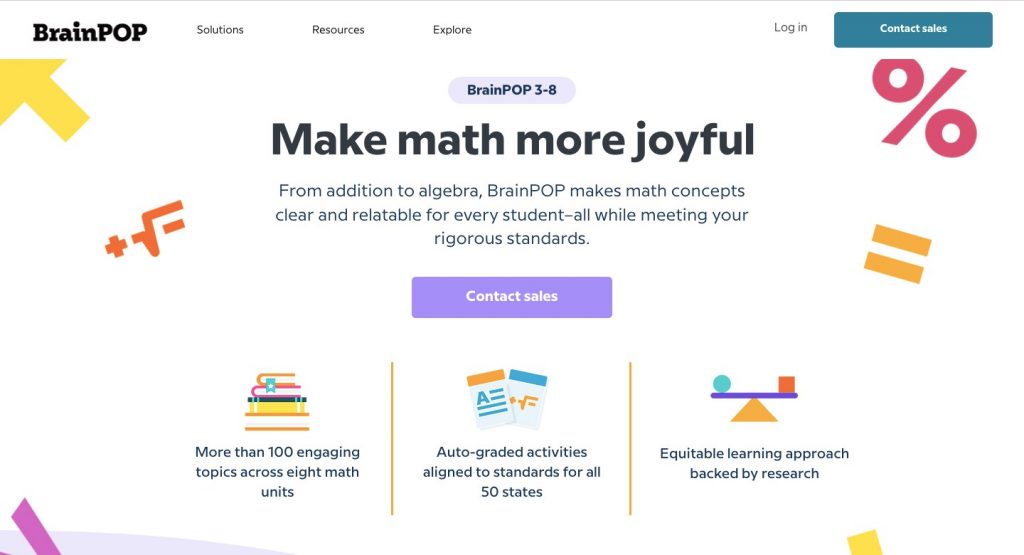
Who is it for: 3rd to 8th Grade
BrainPOP offers animated videos that explain a wide range of math concepts, from basic arithmetic to more advanced topics like algebra and geometry. Each video is accompanied by interactive quizzes, activities, and challenges to reinforce learning. The platform’s engaging content is designed to make complex math topics easier to understand, making it a great resource for both classroom instruction and at-home learning.
BrainPOP also provides teachers and parents with lesson plans, printable worksheets, and the ability to track student progress, making it a comprehensive tool for supporting math education.
6. Math Goodies
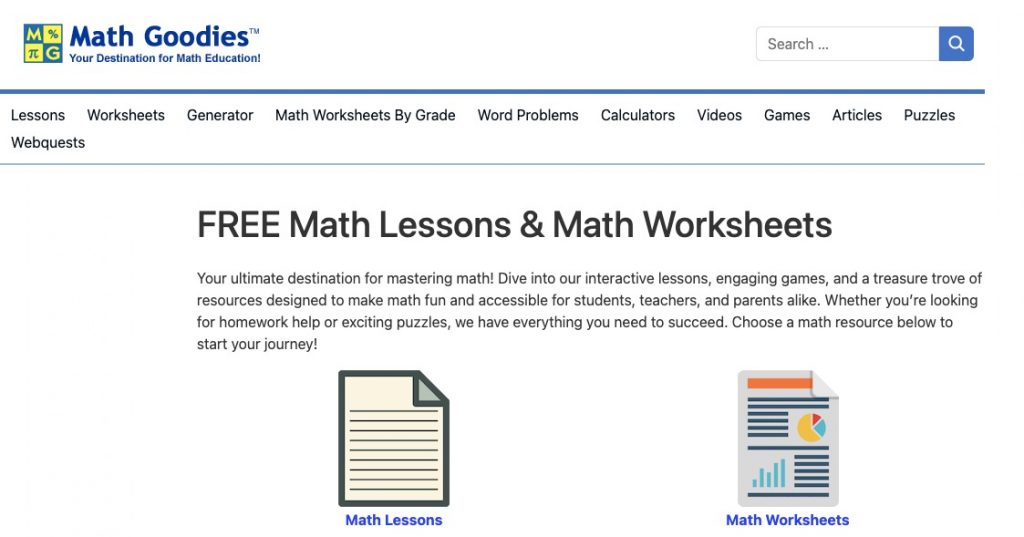
Who is it for: 4th to 12th Grade
Math Goodies is an educational website that offers free math lessons, worksheets, and interactive exercises designed to build a strong foundation in math. It covers topics ranging from basic arithmetic to more advanced concepts like statistics, probability, and algebra. The lessons are presented in a clear, step-by-step format, making it ideal for self-paced learning.
Math Goodies also provides quizzes and problem-solving exercises to test understanding and reinforce learning. It is a valuable resource for both teachers and parents looking for structured math lessons and supplemental materials.
7. IXL
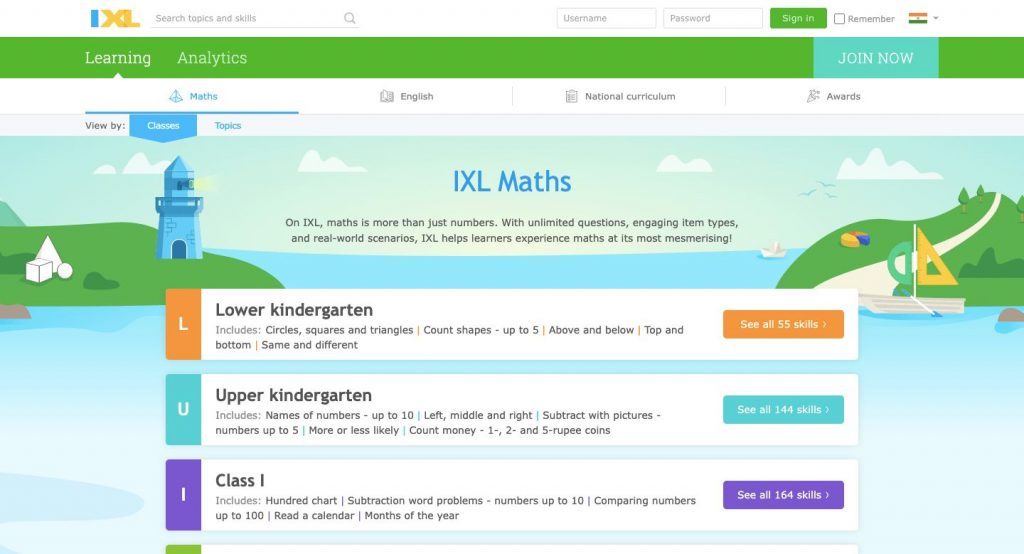
Who is it for: Pre-K to 12th Grade
IXL is a comprehensive online platform that offers practice exercises across a wide range of math topics, covering everything from basic arithmetic to calculus. The platform provides over 8,000 skills aligned with state standards, making it suitable for students at any grade level. IXL uses an adaptive learning system that adjusts the difficulty of questions based on the student’s performance, ensuring personalized practice.
For teachers and parents, IXL offers detailed analytics and reports that track progress, highlight areas of improvement, and provide insights into how much time a student spends on each topic. This makes IXL a powerful tool for both targeted skill practice and overall math proficiency.
8. Khan Academy
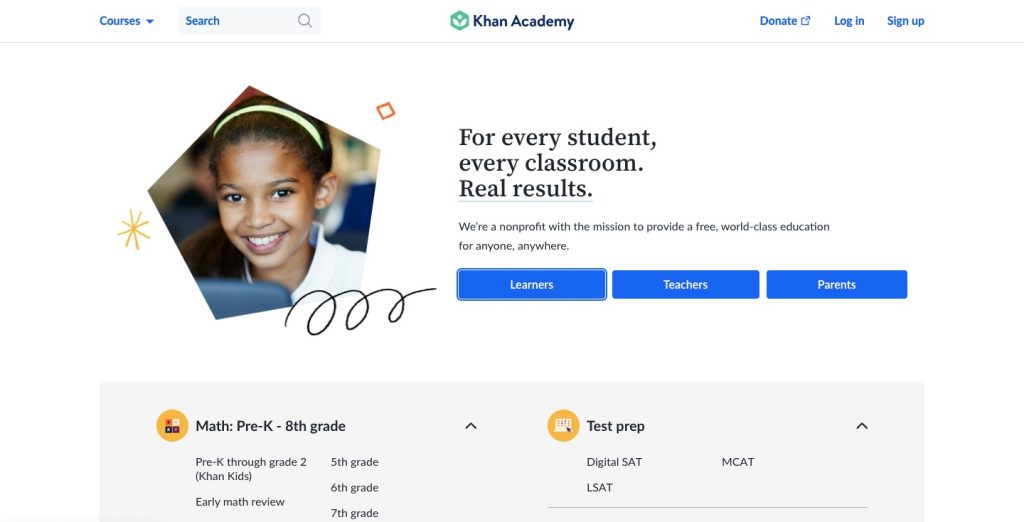
Who is it for: Kindergarten to 12th Grade
Khan Academy is a free, extensive educational platform offering video tutorials and practice exercises in math, ranging from basic counting to advanced calculus and statistics. Each topic is broken down into bite-sized lessons that include step-by-step video explanations, followed by practice problems to reinforce understanding.
The platform also offers progress tracking, personalized learning paths, and mastery challenges to help students achieve proficiency in math. Teachers and parents can use Khan Academy’s classroom tools to assign lessons, track progress, and identify areas where students may need additional help.
9. Math Playground

Who is it for: 1st to 6th Grade
Math Playground is one of the best math websites for kids that offers a variety of math games, puzzles, and interactive problem-solving activities aimed at elementary and middle school students. The platform covers essential math topics such as addition, subtraction, multiplication, division, fractions, and geometry. The games are designed to be both educational and entertaining, helping to reinforce key math concepts through play.
Math Playground also includes logic puzzles and word problems, which promote critical thinking skills. While the website is primarily game-focused, it can be a valuable tool for reinforcing classroom learning and making math practice more enjoyable for kids.
Related Reading: Best Educational Websites for Kids
10. Multiplication.com
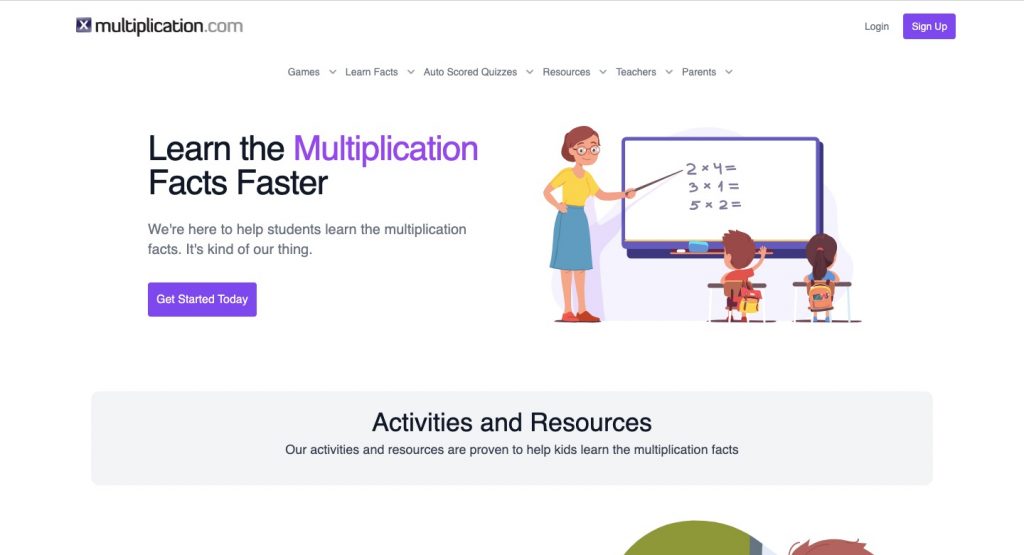
Who is it for: 2nd to 5th Grade
Multiplication.com is a specialized website focused on helping students master multiplication through a variety of interactive games, quizzes, and practice exercises. The platform is designed to make learning multiplication facts fun and engaging, using themed games that appeal to young learners. The site also offers printable worksheets and flashcards, providing additional resources for both classroom use and home practice.
Multiplication.com is particularly useful for students who need extra practice with times tables, and it serves as a targeted resource for teachers and parents looking to improve their child’s multiplication skills.
Related Reading: Best Multiplication Apps for Kids
11. Kahoot!

Who is it for: Kindergarten to 12th Grade
If you are looking for math websites for elementary students Kahoot! Is a great option. It is an interactive learning platform that allows teachers and parents to create and play educational games, known as “Kahoots,” in a quiz format. While Kahoot! covers a broad range of subjects, it is particularly popular for math practice. Users can find or create math quizzes that cover various topics, including basic arithmetic, algebra, and geometry.
The game-based approach makes math practice competitive and engaging, which can be particularly effective in classroom settings or group learning environments. Kahoot! also offers real-time feedback and analytics, helping teachers track student performance and adjust instruction as needed.
12. Education.com
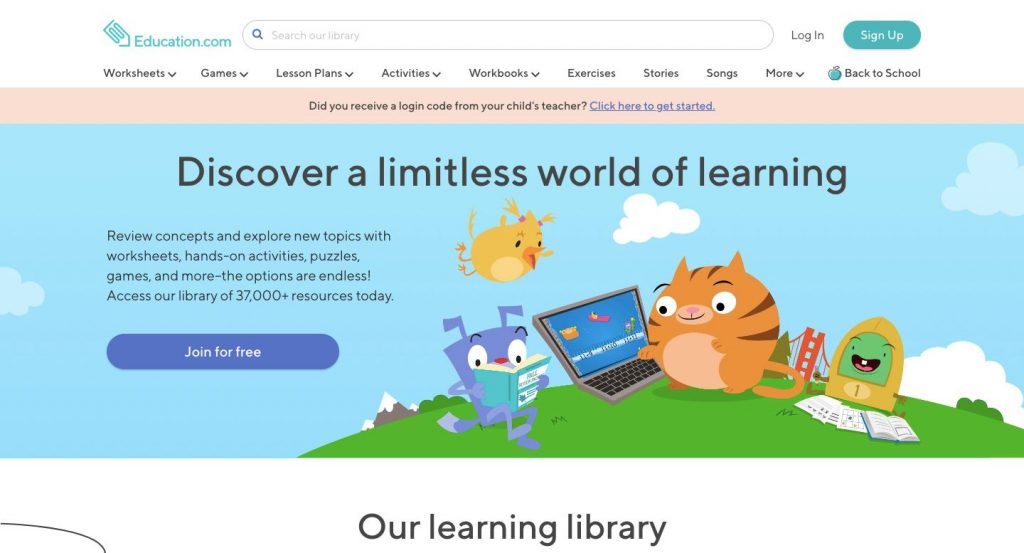
Who is it for: Pre-K to 5th Grade
Education.com offers a vast library of math worksheets, lesson plans, and interactive games designed for kids. The platform covers a wide range of math topics, including counting, basic arithmetic, fractions, and early geometry. The interactive games are tailored to grade levels and help reinforce key math skills in a fun, engaging way.
Teachers and parents can access a variety of resources, including printable worksheets and guided lessons, to support both in-class and at-home learning.
13. Starfall Math
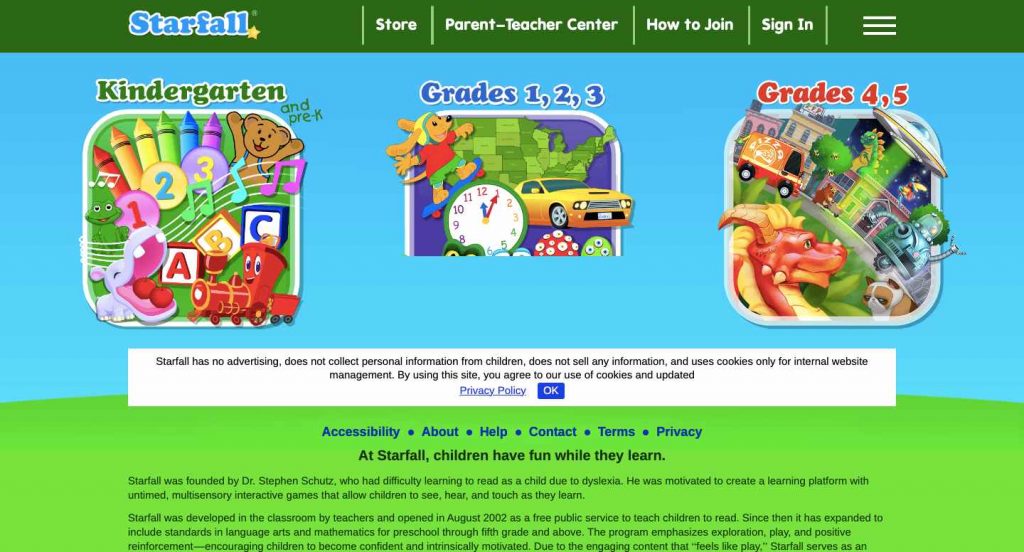
Who is it for: Pre-K to 3rd Grade
Starfall Math is part of the broader Starfall educational platform, which is geared towards early learners. The math section offers interactive lessons and activities focused on foundational math skills, including counting, basic arithmetic, shapes, and measurement. Starfall Math uses colorful animations and simple games to teach concepts in a way that is engaging for young children.
The platform is particularly useful for teachers and parents looking to introduce math concepts in a fun, visually appealing way.
14. ABCya! Math
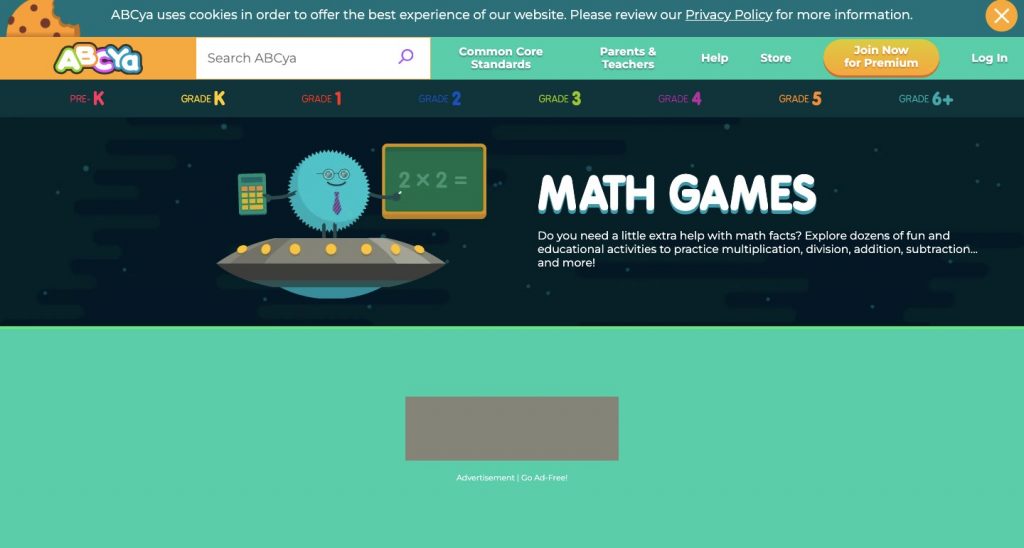
Who is it for: Pre-K to 6th Grade
ABCya! Math offers a wide range of educational games that cover math topics from basic counting and arithmetic to more advanced concepts like fractions and decimals. The games are categorized by grade level, making it easy to find activities that match a child’s current learning needs.
ABCya! Math games are designed to be both educational and entertaining, helping to reinforce math skills through play. The platform is user-friendly and doesn’t require extensive setup, making it ideal for both classroom use and at-home practice.
15. Cool Math Games
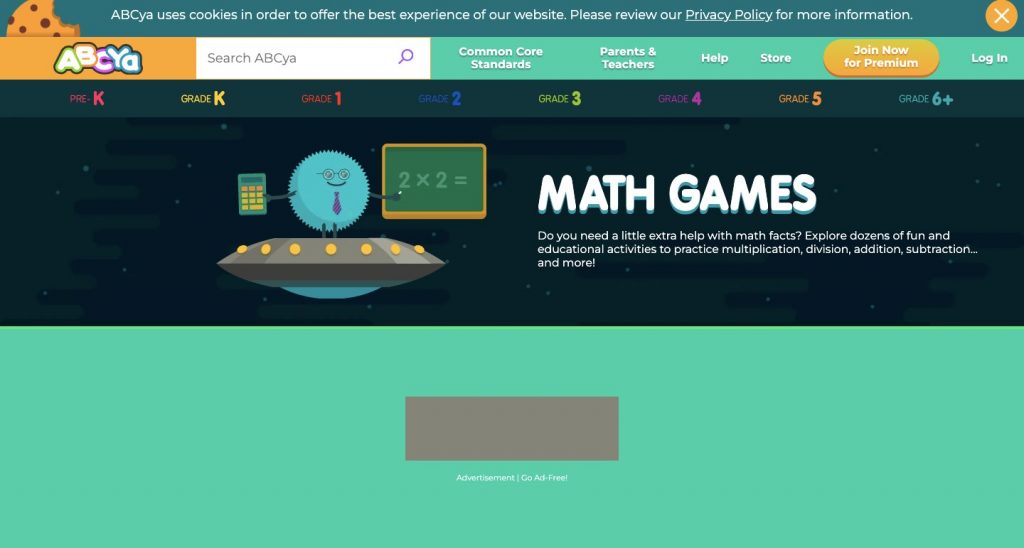
Who is it for: 2nd to 8th Grade
Cool Math Games is a popular online platform that offers a wide variety of math-based games and puzzles designed to make learning math fun. The site covers a range of topics, including basic arithmetic, algebra, logic, and problem-solving skills. While many of the games focus on practicing math skills, others are designed to enhance cognitive abilities like critical thinking and strategy.
Cool Math Games is particularly appealing to kids because it combines learning with entertainment, making it a great resource for both classroom breaks and at-home learning.
Related Reading: Best Math Apps for Kids
Conclusion
Choosing the right math learning platforms can make a huge difference in how kids engage with and enjoy math. Look for interactive math websites for kids that match your child’s grade level and learning style, and offer a good balance of fun and educational content. Explore these options and find the one that best fits your child’s needs to make math learning both effective and enjoyable.
Related Reading: Best Math Games for Kids That Are Fun to Play
Frequently Asked Questions (FAQs)
What are the benefits of online math learning websites?
Online math learning websites offer engaging, interactive content that can make math fun and accessible, helping kids build confidence and improve their skills at their own pace.
Can these math sites help kids with special needs?
Yes, many math sites provide adaptive learning tools and personalized content that can cater to the unique needs of kids with special needs, offering extra support where needed.
Can these websites be used as supplementary tools alongside school learning?
Absolutely, these websites are excellent supplementary tools that can reinforce classroom lessons, provide extra practice, and help fill in learning gaps outside of school hours.
































